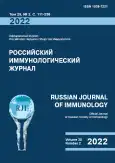Type III interferons in community-acquired pneumonia in children
- Authors: Iziurova N.V.1, Savochkina A.Y.1, Uzunova A.N.1, Nikushkina K.V.1
-
Affiliations:
- South Ural Medical State University
- Issue: Vol 25, No 2 (2022)
- Pages: 181-186
- Section: SHORT COMMUNICATIONS
- URL: https://bakhtiniada.ru/1028-7221/article/view/120177
- DOI: https://doi.org/10.46235/1028-7221-1118-TII
- ID: 120177
Cite item
Full Text
Abstract
The relevance of community-acquired pneumonia is due to its widespread prevalence in pediatric practice, due to high level of morbidity and mortality in this pathological condition. Anti-infectious protection is of great importance in prevention of community-acquired pneumonia, primarily, the state of innate immunity, including cellular and humoral immune response. Among the factors of innate immunity, cytokines play an important role, being the most important mediators that control and regulate immune and inflammatory responses via complex networks and serve as biomarkers of many diseases. A single cytokine may be secreted by different cells and exhibit both pro-inflammatory and anti-inflammatory activity, depending on its context, thus causing multiple immune responses. Among cytokines, interferons play a significant role, being among sufficient factors of innate immunity. The study determined the level of type III interferons (IFNλ2 (IL-28A) and IFNλ3 (IL-28B)) in blood serum of 117 children with community-acquired pneumonia aged 1 to 18 years with an X-ray confirmed diagnosis of community-acquired pneumonia, hospitalized at the Departments of Respiratory Infections at the Pediatric Clinical Hospitals No. 7 and 8 in Chelyabinsk. All children were represented by 3 age groups, according to the generally accepted critical periods of immune system maturation, i.e., 1 to 3 years old; 4 to 7, and 8 to 18 years old. The comparison group was recruited during routine medical examination of healthy children and consisted of 28 subjects who did not show any signs of acute respiratory viral infection at the time of examination, and had no detectable chronic diseases. The purpose of this study was to determine the concentration of type III interferons in blood serum of children with community-acquired pneumonia at different ages, and to assess changes in indices, depending on the severity of the disease. According to the results of the study, we have revealed that the serum concentrations of type III interferons, in particular, IFNλ2 (IL-28A) and IFNλ3 (IL-28B) among the children with community-acquired pneumonia, were significantly higher in the subgroup of children with severe pneumonia. Significant differences in concentrations of type III interferons were shown for the children in different age groups, which may be due to peculiar features of immune system activation at different age periods and immaturity of immune system in children.
Keywords
Full Text
##article.viewOnOriginalSite##About the authors
Natalia V. Iziurova
South Ural Medical State University
Author for correspondence.
Email: Natusaz@live.ru
ORCID iD: 0000-0002-0049-2194
SPIN-code: 7970-7527
Assistant Professor, Department of Propaedeutics of Children’s Diseases and Pediatrics
Russian Federation, 64, Vorovsky str., Chelyabinsk, 454092Albina Yu. Savochkina
South Ural Medical State University
Email: alina7423@mail.ru
ORCID iD: 0000-0002-0536-0924
PhD, MD (Medicine), Professor, Department of Clinical Laboratory Diagnostics
Russian Federation, 64, Vorovsky str., Chelyabinsk, 454092Anna N. Uzunova
South Ural Medical State University
Email: propeddet@mail.ru
PhD, MD (Medicine), Professor, Department of Propaedeutics of Children’s Diseases and Pediatrics
Russian Federation, 64, Vorovsky str., Chelyabinsk, 454092Karina V. Nikushkina
South Ural Medical State University
Email: knikushkina81@gmail.ru
PhD (Medicine), Leading Research Associate, Institute of Immunology
Russian Federation, 64, Vorovsky str., Chelyabinsk, 454092References
- Пневмония (внебольничная). Оригинал-макет, 2022. 82 с. [Электронный ресурс]. Режим доступа: https://cr.minzdrav.gov.ru/schema/714_1. [Pneumonia (community-acquired). Original layout, 2022, 82 p. [Electronic resource]. Access mode: https://cr.minzdrav.gov.ru/schema/714_1.
- Хаитов Р.М. Иммунология: учебник. 4-е изд., перераб. и доп. М.: ГЭОТАР-Медиа, 2021. 520 с. [Khaitov R.M. Immunology. 4th edition, rev. and suppl.]. Moscow: GEOTAR-Media, 2021. 520 p.
- Global Health Observatory.Proportions of child death by cause. WHO, Geneva Accessed on 24 July 2014. Available at: http://www.who.int/gho/child_health/en/index.html.
- Fukuda Y., Homma T., Inoue H., Onitsuka C., Ikeda H., Goto Y., Sato Y., Kimura T., Hirai K., Ohta S., Yamamoto M., Kusumoto S., Suzuki S., Tanaka A., Sagara H. Downregulation of type III interferons in patients with severe COVID-19. J. Med. Virol., 2021, Vol. 93, no. 7, pp. 4559-4563.
- Haugen J., Chandyo R.K., Brokstad K.A., Mathisen M., Ulak M., Basnet S., Valentiner-Branth P., Strand T.A. Cytokine concentrations in plasma from children with severe and non-severe community acquired pneumonia. PLoS One, 2015, Vol. 10, no. 9, e0138978. doi: 10.1371/journal.pone.0138978.
- Kleiner G., Marcuzzi A., Zanin V., Monasta L., Zauli G. Cytokine levels in the serum of healthy subjects. Mediators Inflamm., 2013, Vol. 2013, 434010. doi: 10.1155/2013/434010.
- Major J., Crotta S., Llorian M., McCabe T.M., Gad H.H., Priestnall S.L., Hartmann R., Wack A. Type I and III interferons disrupt lung epithelial repair during recovery from viral infection. Science, 2020, Vol. 369, no. 6504, pp. 712-717.
- Negishi H., Taniguchi T., Yanai H. The Interferon (IFN) Class of Cytokines and the IFN Regulatory Factor (IRF) Transcription Factor Family. Cold Spring Harb. Perspect. Biol., 2018, Vol. 10, no. 11, a028423. doi: 10.1101/cshperspect. a028423.
- Ye L., Schnepf D., Staeheli P. Interferon-λ orchestrates innate and adaptive mucosal immune responses. Nat. Rev. Immunol., 2019, Vol. 19, no. 10, pp. 614-625.
- Yun K.W., Wallihan R., Juergensen A., Mejias A., Ramilo O. Community-acquired pneumonia in children: myths and facts. Am. J. Perinatol., 2019, Vol. 36, no. S 02, pp. S54-S57.
Supplementary files







